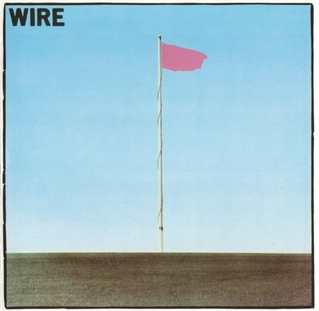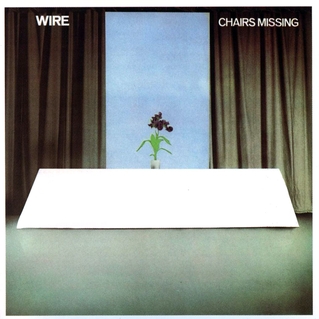Wire were born at the dawn of punk, but they became the quintessential art band. In the three closing years of the 1970s, the English quartet had one of the greatest opening runs of any band, shifting to post-punk before punk began to go stale and forging three masterpieces in a creative furnace so hot it burned out by the end of 1980. Those albums-- Pink Flag, Chairs Missing, and 154-- still sound remarkably fresh, and have been re-mastered and reissued with their original vinyl tracklistings, both individually and as part of a five-disc set, 1977>1979, that also includes live performances recorded in London (in 1977) and New York (1978).
Pink Flag was a fractured snapshot of punk alternately collapsing in on itself and exploding into song-fragment shrapnel. The record's minimalist approach means the band spends only as much time as needed on each song-- five of them are over in less than a minute, while a further nine don't make it past two. It's clear you're not getting a typical 1977 punk record from the opening seconds of "Reuters", an echoing bass line that quickly comes under attack by ringing but dissonant guitar chords. The tempo is arrested, lurching along to the climactic finale when Colin Newman, as the narrating correspondent, shouts "Looting! Burning!" and then holds out the lone syllable of "rape" twice over descending chords, which grind to a halt over chanting voices. It's all the bombast, tension, and release of a side-long prog opus in just three minutes.
As if to underscore that this isn't a predictable album, the next song, "Field Day For the Sundays", rages to a close in just 28 seconds. The band acknowledges the thin line between advertising jingles and pop songs on the 49-second instrumental "The Commercial", but also write a few genuinely hummable songs, like "Three Girl Rhumba", whose guitar part is actually more of a tango, and the more identifiably punk "Ex-Lion Tamer". "Strange," meanwhile, makes the mistake of sticking around, only to be eaten by spacey amp noise and quivering ambience-- a taste of things to come.
Wire immediately left the crunch of Pink Flag behind on Chairs Missing, 1978's great leap into even artier weirdness and Brian Eno-inspired ambient experiments. Producer Mike Thorne's synthesizers took a more key role, propelling songs into haunting soundscapes and downpours of noise. The funny thing is that, though a fairly major departure for the band, the album cloaks its curveball up front, beginning as Pink Flag did: With bassist Graham Lewis's nakedly produced pulse being attacked by guitars. "Practise Makes Perfect" seems almost cheekily named for the way it builds directly on the constant crescendo structure of "Reuters", except this time Newman's ragged vocal is met with interjections of derisive laughter and the final comedown leads into a bed of gently viscous synth.
That denouement foreshadows one of the album's most arresting tracks, the starkly minimal bass-and-electronics sculpture "Heartbeat", an openly beautiful piece of experimentation that morphs into a pop song without a chorus. The album as a whole is less purposefully fragmented than its predecessor, the songs more conventionally structured even as they veer in unexpected directions. The stunning centerpiece is "Mercy", which provides the basic blueprint for an absolute ton of tension/release post-rock. Over nearly six minutes, it storms through thunderous verses with Robert Gotobed's drums shuddering away underneath. Each new section leads to a nastier climax, culminating in a blazing guitar-and-drum conflagration.
On 1979's 154, named for the number of shows Wire had played to that point, the band moved further into the abstract. "On Returning", "The 15th", and "Two People in a Room" are concise, punchy songs that place the vocals up front, sometimes with two-part harmonies. The last of these is one of Wire's great, frenzied moments, with Newman's tortured vocals shouting down Bruce Gilbert's intravenous guitar riffs with crazed shouts of "My God, they're so gifted!" 154's centerpiece, "A Touching Display", out-apocalypses "Mercy"; it's a hellish soundscape that features Lewis' heavily distorted and processed bass fretting out a harrowing anti-melody. Despite the incredible highs, though, 154 is also the least consistent of Wire's first three albums, and a few of its experiments don't bear full fruit.
One of Wire's overlooked strengths was their ability to write a tremendous pop song, as exemplified by songs like "Mannequin", "Outdoor Miner", and "Map Ref. 41 Degrees N 93 Degrees W" (an open field in Iowa, by the way). Listen to the harmonized "ooh ooh"s on "Mannequin", the softly sung verses of "Outdoor Miner" (which was only prevented from chart success by a payola scandal), and the transcendently huge chorus of "Map Ref." indicate this was a band that could have made an entire career out of harmony-laden power pop.
As it stands, they didn't, and Wire famously quit a year after 154, claiming to have run out of ideas. Their subsequent reunions have put the lie to that notion, but you have to admire Wire's insistence on laying off when the inspiration doesn't feel right, even as the band's initial run remains an unassailable testament to its unquenchable creativity.


